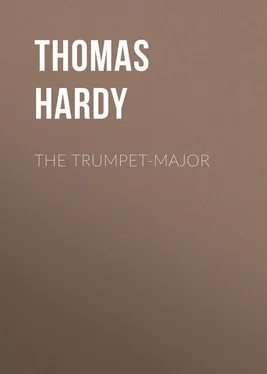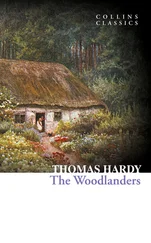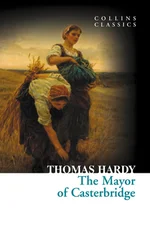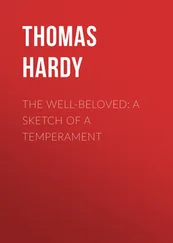Thomas Hardy - The Trumpet-Major
Здесь есть возможность читать онлайн «Thomas Hardy - The Trumpet-Major» — ознакомительный отрывок электронной книги совершенно бесплатно, а после прочтения отрывка купить полную версию. В некоторых случаях можно слушать аудио, скачать через торрент в формате fb2 и присутствует краткое содержание. Жанр: foreign_antique, foreign_prose, на английском языке. Описание произведения, (предисловие) а так же отзывы посетителей доступны на портале библиотеки ЛибКат.
- Название:The Trumpet-Major
- Автор:
- Жанр:
- Год:неизвестен
- ISBN:нет данных
- Рейтинг книги:5 / 5. Голосов: 1
-
Избранное:Добавить в избранное
- Отзывы:
-
Ваша оценка:
- 100
- 1
- 2
- 3
- 4
- 5
The Trumpet-Major: краткое содержание, описание и аннотация
Предлагаем к чтению аннотацию, описание, краткое содержание или предисловие (зависит от того, что написал сам автор книги «The Trumpet-Major»). Если вы не нашли необходимую информацию о книге — напишите в комментариях, мы постараемся отыскать её.
The Trumpet-Major — читать онлайн ознакомительный отрывок
Ниже представлен текст книги, разбитый по страницам. Система сохранения места последней прочитанной страницы, позволяет с удобством читать онлайн бесплатно книгу «The Trumpet-Major», без необходимости каждый раз заново искать на чём Вы остановились. Поставьте закладку, и сможете в любой момент перейти на страницу, на которой закончили чтение.
Интервал:
Закладка:
Immediately before her was the large, smooth millpond, over-full, and intruding into the hedge and into the road. The water, with its flowing leaves and spots of froth, was stealing away, like Time, under the dark arch, to tumble over the great slimy wheel within. On the other side of the mill-pond was an open place called the Cross, because it was three-quarters of one, two lanes and a cattle-drive meeting there. It was the general rendezvous and arena of the surrounding village. Behind this a steep slope rose high into the sky, merging in a wide and open down, now littered with sheep newly shorn. The upland by its height completely sheltered the mill and village from north winds, making summers of springs, reducing winters to autumn temperatures, and permitting myrtle to flourish in the open air.
The heaviness of noon pervaded the scene, and under its influence the sheep had ceased to feed. Nobody was standing at the Cross, the few inhabitants being indoors at their dinner. No human being was on the down, and no human eye or interest but Anne’s seemed to be concerned with it. The bees still worked on, and the butterflies did not rest from roving, their smallness seeming to shield them from the stagnating effect that this turning moment of day had on larger creatures. Otherwise all was still.
The girl glanced at the down and the sheep for no particular reason; the steep margin of turf and daisies rising above the roofs, chimneys, apple-trees, and church tower of the hamlet around her, bounded the view from her position, and it was necessary to look somewhere when she raised her head. While thus engaged in working and stopping her attention was attracted by the sudden rising and running away of the sheep squatted on the down; and there succeeded sounds of a heavy tramping over the hard sod which the sheep had quitted, the tramp being accompanied by a metallic jingle. Turning her eyes further she beheld two cavalry soldiers on bulky grey chargers, armed and accoutred throughout, ascending the down at a point to the left where the incline was comparatively easy. The burnished chains, buckles, and plates of their trappings shone like little looking-glasses, and the blue, red, and white about them was unsubdued by weather or wear.
The two troopers rode proudly on, as if nothing less than crowns and empires ever concerned their magnificent minds. They reached that part of the down which lay just in front of her, where they came to a halt. In another minute there appeared behind them a group containing some half-dozen more of the same sort. These came on, halted, and dismounted likewise.
Two of the soldiers then walked some distance onward together, when one stood still, the other advancing further, and stretching a white line of tape between them. Two more of the men marched to another outlying point, where they made marks in the ground. Thus they walked about and took distances, obviously according to some preconcerted scheme.
At the end of this systematic proceeding one solitary horseman – a commissioned officer, if his uniform could be judged rightly at that distance – rode up the down, went over the ground, looked at what the others had done, and seemed to think that it was good. And then the girl heard yet louder tramps and clankings, and she beheld rising from where the others had risen a whole column of cavalry in marching order. At a distance behind these came a cloud of dust enveloping more and more troops, their arms and accoutrements reflecting the sun through the haze in faint flashes, stars, and streaks of light. The whole body approached slowly towards the plateau at the top of the down.
Anne threw down her work, and letting her eyes remain on the nearing masses of cavalry, the worsteds getting entangled as they would, said, ‘Mother, mother; come here! Here’s such a fine sight! What does it mean? What can they be going to do up there?’
The mother thus invoked ran upstairs and came forward to the window. She was a woman of sanguine mouth and eye, unheroic manner, and pleasant general appearance; a little more tarnished as to surface, but not much worse in contour than the girl herself.
Widow Garland’s thoughts were those of the period. ‘Can it be the French,’ she said, arranging herself for the extremest form of consternation. ‘Can that arch-enemy of mankind have landed at last?’ It should be stated that at this time there were two arch-enemies of mankind – Satan as usual, and Buonaparte, who had sprung up and eclipsed his elder rival altogether. Mrs. Garland alluded, of course, to the junior gentleman.
‘It cannot be he,’ said Anne. ‘Ah! there’s Simon Burden, the man who watches at the beacon. He’ll know!’
She waved her hand to an aged form of the same colour as the road, who had just appeared beyond the mill-pond, and who, though active, was bowed to that degree which almost reproaches a feeling observer for standing upright. The arrival of the soldiery had drawn him out from his drop of drink at the ‘Duke of York’ as it had attracted Anne. At her call he crossed the mill-bridge, and came towards the window.
Anne inquired of him what it all meant; but Simon Burden, without answering, continued to move on with parted gums, staring at the cavalry on his own private account with a concern that people often show about temporal phenomena when such matters can affect them but a short time longer. ‘You’ll walk into the millpond!’ said Anne. ‘What are they doing? You were a soldier many years ago, and ought to know.’
‘Don’t ask me, Mis’ess Anne,’ said the military relic, depositing his body against the wall one limb at a time. ‘I were only in the foot, ye know, and never had a clear understanding of horses. Ay, I be a old man, and of no judgment now.’ Some additional pressure, however, caused him to search further in his worm-eaten magazine of ideas, and he found that he did know in a dim irresponsible way. The soldiers must have come there to camp: those men they had seen first were the markers: they had come on before the rest to measure out the ground. He who had accompanied them was the quartermaster. ‘And so you see they have got all the lines marked out by the time the regiment have come up,’ he added. ‘And then they will – well-a-deary! who’d ha’ supposed that Overcombe would see such a day as this!’
‘And then they will – ’
‘Then – Ah, it’s gone from me again!’ said Simon. ‘O, and then they will raise their tents, you know, and picket their horses. That was it; so it was.’
By this time the column of horse had ascended into full view, and they formed a lively spectacle as they rode along the high ground in marching order, backed by the pale blue sky, and lit by the southerly sun. Their uniform was bright and attractive; white buckskin pantaloons, three-quarter boots, scarlet shakos set off with lace, mustachios waxed to a needle point; and above all, those richly ornamented blue jackets mantled with the historic pelisse – that fascination to women, and encumbrance to the wearers themselves.
‘’Tis the York Hussars!’ said Simon Burden, brightening like a dying ember fanned. ‘Foreigners to a man, and enrolled long since my time. But as good hearty comrades, they say, as you’ll find in the King’s service.’
‘Here are more and different ones,’ said Mrs. Garland.
Other troops had, during the last few minutes, been ascending the down at a remoter point, and now drew near. These were of different weight and build from the others; lighter men, in helmet hats, with white plumes.
‘I don’t know which I like best,’ said Anne. ‘These, I think, after all.’
Simon, who had been looking hard at the latter, now said that they were the – th Dragoons.
‘All Englishmen they,’ said the old man. ‘They lay at Budmouth barracks a few years ago.’
Читать дальшеИнтервал:
Закладка:
Похожие книги на «The Trumpet-Major»
Представляем Вашему вниманию похожие книги на «The Trumpet-Major» списком для выбора. Мы отобрали схожую по названию и смыслу литературу в надежде предоставить читателям больше вариантов отыскать новые, интересные, ещё непрочитанные произведения.
Обсуждение, отзывы о книге «The Trumpet-Major» и просто собственные мнения читателей. Оставьте ваши комментарии, напишите, что Вы думаете о произведении, его смысле или главных героях. Укажите что конкретно понравилось, а что нет, и почему Вы так считаете.












